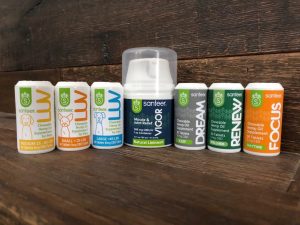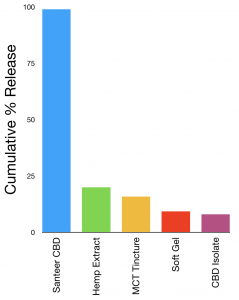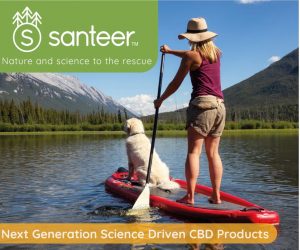In the steadily growing world of CBD products, it’s more critical than ever for companies to differentiate themselves in a saturated marketplace. CBD brands are challenged with federal regulations, testing limitations, and endless competition.
Some brands turn to generic branding or false claims to sell products, while others sway test results with chemicals that could cause more harm than good for consumers. For Colorado Chemist, Chris Denicola, consistent innovation and next-generation technology were the main drivers.
These pillars led him to create stand-out products with record-breaking solubility, going beyond the typical tincture.
Using Technology as a Guide
Denicola worked with his team of chemists at Prism Science to create a product that allowed the maximum amount of CBD to be released and absorbed into the body upon consumption. No solubility-enhancing chemicals necessary.

It took 30 different types of technology and two and a half years for Denicola to create a line of CBD products with a solubility rate of over 95 percent, that he later branded Santeer™.
Denicola also utilized proprietary technology to discern the different compounds present in cannabis apart from one another, allowing him to design effect-driven formulations of CBD.
Santeer’s Chewable Tablet is ten times more soluble than soft gels, five times more soluble than hemp oil and tinctures, and twice as soluble than the latest water-soluble products currently on the market.
Essentially this means your body isn’t absorbing nearly as much of the CBD as it could. However, this notion isn’t necessarily glass-shattering to your average consumer.
Consumers don’t know what they don’t know, and if they’re already comfortable with a specific consumption method, why should they change?
Why Solubility Matters
If you’ve ever wondered if your “CBD only” product will cause you to fail a THC drug test, the answer might be solubility.
When using MCT tinctures, hemp oils, and soft gels, your body is only absorbing between 9-20 percent of the product’s CBD and excreting the rest.
If you’re not absorbing the CBD, you’ll likely take more until you can feel it working. This habit causes you to burn through all of those pricey products rather quickly.

Most consumers don’t understand that if you’re using tinctures or oils, you’re also absorbing more THC.
Products with higher solubility rates contain lower doses of THC, meaning capsules and tinctures with low solubility are higher in THC.
If you’re consuming products with low solubility rates, you’re introducing more THC into your system than you might realize.
To put that into perspective, Santeer’s Chewable Tablets have 0.1 percent or 0.2 milligrams of THC. One serving of a CBD tincture testing at 0.3 percent THC will have three milligrams.
When you think of it that way, only one dose of a standard hemp oil tincture could put someone at risk for failing a drug test. The culprit? Low solubility rates.
Possibilities of High-Tech Testing
With all of the technology at our disposal, there are still a lot of unanswered questions.
The extensive testing that costs millions of dollars could answer a few of them, but more advanced technology is still needed to understand the intricacies fully.

For example, the direct correlation between solubility and bioavailability in full spectrum products is not clear.
The only bioavailability data currently available to us is around CBD and hemp oil alone.
Another factor to consider is that the minimum viable amount of THC needed to generate the “Entourage Effect” is still unknown.
What is known is that CBD Isolate or Broad Spectrum Distillate that contains zero THC is not as effective as CBD with even small amounts of THC.
Once these current questions are addressed through advanced testing, there’s no doubt more questions will follow. Technology will continue to evolve and surprise us.
The only thing CBD companies can do is try to keep up, ensuring that as technology progresses, products improve along with it.
Header image courtesy of Pixabay.







